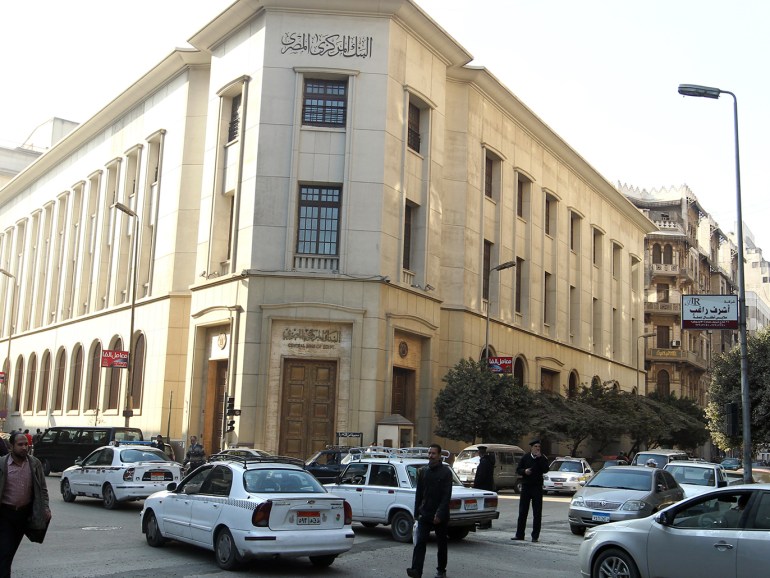Egypt has seen hundreds of millions of dollars out of foreign exchange markets since Russia's war on Ukraine last week, as investors flee emerging markets for safer investments, two bankers familiar with the matter said.
According to a Reuters report, before the outbreak of the crisis, Egypt maintained the demand for treasury bills to fill a deficit in the current account and budget, and stave off pressures that push its currency to decline before the Federal Reserve (US Central Bank) decision to raise interest rates starting this month.
The two bankers said that a moderate selling wave of Egyptian debt securities began last Thursday, and gained momentum when dealings in European markets began last Monday.
One of them said that a few hundred million dollars came out of the secondary market last Monday, and that the return on Egyptian pound notes jumped by between 30% and 40% on average.
The second banker estimated that foreign investors withdrew 3 billion dollars from Egypt since last Thursday, based on an estimate of higher returns and an increase in activity in the interbank currency market and information obtained from other banks.
The two sources said that after this initial wave, the market had relatively calmed down on Tuesday and Wednesday.
Investors worry
Many investors are concerned that emerging markets will be more vulnerable to any shocks from the disruption to trade with Russia, including
the resulting increase in the prices of some commodities.
What is actually exacerbating Egypt's economic problems is the risk that the Ukrainian crisis will raise the prices of imported wheat.
Russia and Ukraine were the source of about 80% of Egypt's wheat imports in 2021. The General Authority for Supply Commodities, which handles the purchase of wheat for the state, canceled on Monday a second international tender to buy wheat after the crisis raised prices.
Twenty billion dollar bills
Since November 2020, the Central Bank has kept overnight interest rates unchanged, and the Egyptian currency has actually stabilized at about 15.70 pounds against the dollar, which helped maintain its strong image, which was reinforced by the continued growth of the economy during the Covid-19 pandemic.
According to central bank data, foreign investors owned treasury bills for up to one year worth 321.8 billion pounds (20.55
billion dollars) until the end of last December, in addition to an undisclosed amount with longer terms.
“These inflows from portfolio investors were entering the local currency market, and that financed the current account deficit,” Yvonne Mango, an economist at Renaissance Capital, told reporters in an online conference.
Official data show that the current account deficit rose to 4 billion dollars in the three months from July to September last from 2.8 billion dollars a year ago due to the increasing cost of imports.
pressure on the pound
Bankers and analysts say a sharp decline in net foreign assets in the Egyptian banking system shows the extent of the pressure on the exchange rate has increased.
Central Bank data show that net foreign assets fell to 11.8 billion pounds last January, to its lowest level since April 2017.
Another sign of pressure, bankers say, is a sharp increase in central bank auctions of short-term deposits to local banks
through open market operations.
According to central bank data, foreign investors owned treasury bills with terms exceeding $20 billion until the end of last December (European News Agency)
Central Bank data show that its volume rose 360 billion Egyptian pounds (23 billion dollars) since early last October to 985.35 billion pounds since the first of the previous March.
Many bankers say that these operations aim in part to absorb liquidity in the market to reduce inflation, but they also serve to
discourage local banks from pushing foreign investors - and the foreign exchange they bring - out of the treasury bills market.
Bankers add that any increase in US interest rates will likely be absorbed into domestic T-bills markets and
open market operations.
The higher interest rate costs faced by the government are likely to increase pressure on the currency, and they also risk squeezing
the budget deficit, of which the government already spends more than 36 percent on servicing government debt.
Mango, an economist at Renaissance Capital, predicted that the local currency would fall to 16.2 pounds against the dollar by the end of next June.
"I think it is trying to move towards moderate devaluation rather than maintaining it at something like a fixed peg as we have seen," she said of the central bank.
"I don't think they will continue to try to throw everything at the Egyptian pound in an effort to stabilize it," she added.
Tourism faces a new problem
Last December, Central Bank Governor Tariq Amer said that the monetary authorities felt during the pandemic that decreasing the exchange rate would not bring back tourists to the country or support exports, which prompted them to intervene with large reserves.
The government has increased its debt in an effort to cover the loss of tourism income since the outbreak of the pandemic two years ago.
However, the Ukrainian crisis is now threatening to deal another blow to tourist numbers.
The head of Emco Tourism, Elhamy El-Zayat, said that Russians represent about 10% of the tourists coming to Egypt, while Ukrainian tourists represent about 3%, despite the lack of official statistics.

